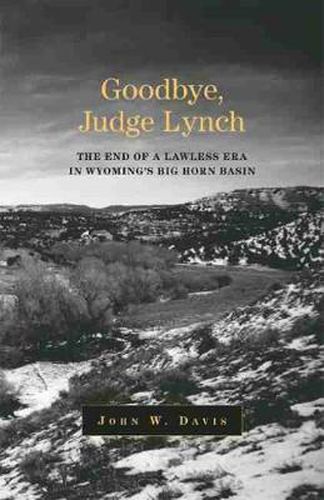Readings Newsletter
Become a Readings Member to make your shopping experience even easier.
Sign in or sign up for free!
You’re not far away from qualifying for FREE standard shipping within Australia
You’ve qualified for FREE standard shipping within Australia
The cart is loading…






The big Horn Basin of northern Wyoming was one of the last frontiers in the continental United States. With settlers did not arrive until 1879, when cattlemen poured into the Basin to capture empty grasslands. In their haste to seize opportunity, the new residents did not establish an effective criminal justice system, and the consequence was rampant violence. In Goodbye, Judge Lynch, John W. Davis tells the fascinating story of how lawlessness finally came to an end in this remote corner of the West.The cattlemen who arrived in the Big Horn Basin in the 1880s were almost all young men, hardworking but impulsive. Without a legal system to control them, extralegal practices, such as lynching and sheep raids, grew at an alarming rate.
Davis examines murders, assaults, and thefts in the region over the course of three decades, when the problems of prosecution were overwhelming. He highlights the infamous 1902 case of State v. Jim Gormon, in which Gormon, infatuated with his sister-in-law, killed his brother. Although Gormon received a first-degree murder conviction, a shocking breakdown of order ensued, when a mob attacked the Big Horn County jail and killed Gormon, another prisoner, and a deputy sheriff. Six years later, in another infamous case, raiders murdered three sheepherders. Impunity was the immediate result, and the defeat of law and order in the region seemed complete. But authorities fought the odds and finally gained guilty verdicts, the first convictions of sheep raiders in Wyoming. This legal victory marked the end of a brief but powerful vigilante tradition.
The first in-depth assessment of vigilantism and justice in the region, Goodbye, Judge Lynch reveals the unique challenges faced by a western society attempting to build a social system from scratch.
$9.00 standard shipping within Australia
FREE standard shipping within Australia for orders over $100.00
Express & International shipping calculated at checkout
The big Horn Basin of northern Wyoming was one of the last frontiers in the continental United States. With settlers did not arrive until 1879, when cattlemen poured into the Basin to capture empty grasslands. In their haste to seize opportunity, the new residents did not establish an effective criminal justice system, and the consequence was rampant violence. In Goodbye, Judge Lynch, John W. Davis tells the fascinating story of how lawlessness finally came to an end in this remote corner of the West.The cattlemen who arrived in the Big Horn Basin in the 1880s were almost all young men, hardworking but impulsive. Without a legal system to control them, extralegal practices, such as lynching and sheep raids, grew at an alarming rate.
Davis examines murders, assaults, and thefts in the region over the course of three decades, when the problems of prosecution were overwhelming. He highlights the infamous 1902 case of State v. Jim Gormon, in which Gormon, infatuated with his sister-in-law, killed his brother. Although Gormon received a first-degree murder conviction, a shocking breakdown of order ensued, when a mob attacked the Big Horn County jail and killed Gormon, another prisoner, and a deputy sheriff. Six years later, in another infamous case, raiders murdered three sheepherders. Impunity was the immediate result, and the defeat of law and order in the region seemed complete. But authorities fought the odds and finally gained guilty verdicts, the first convictions of sheep raiders in Wyoming. This legal victory marked the end of a brief but powerful vigilante tradition.
The first in-depth assessment of vigilantism and justice in the region, Goodbye, Judge Lynch reveals the unique challenges faced by a western society attempting to build a social system from scratch.